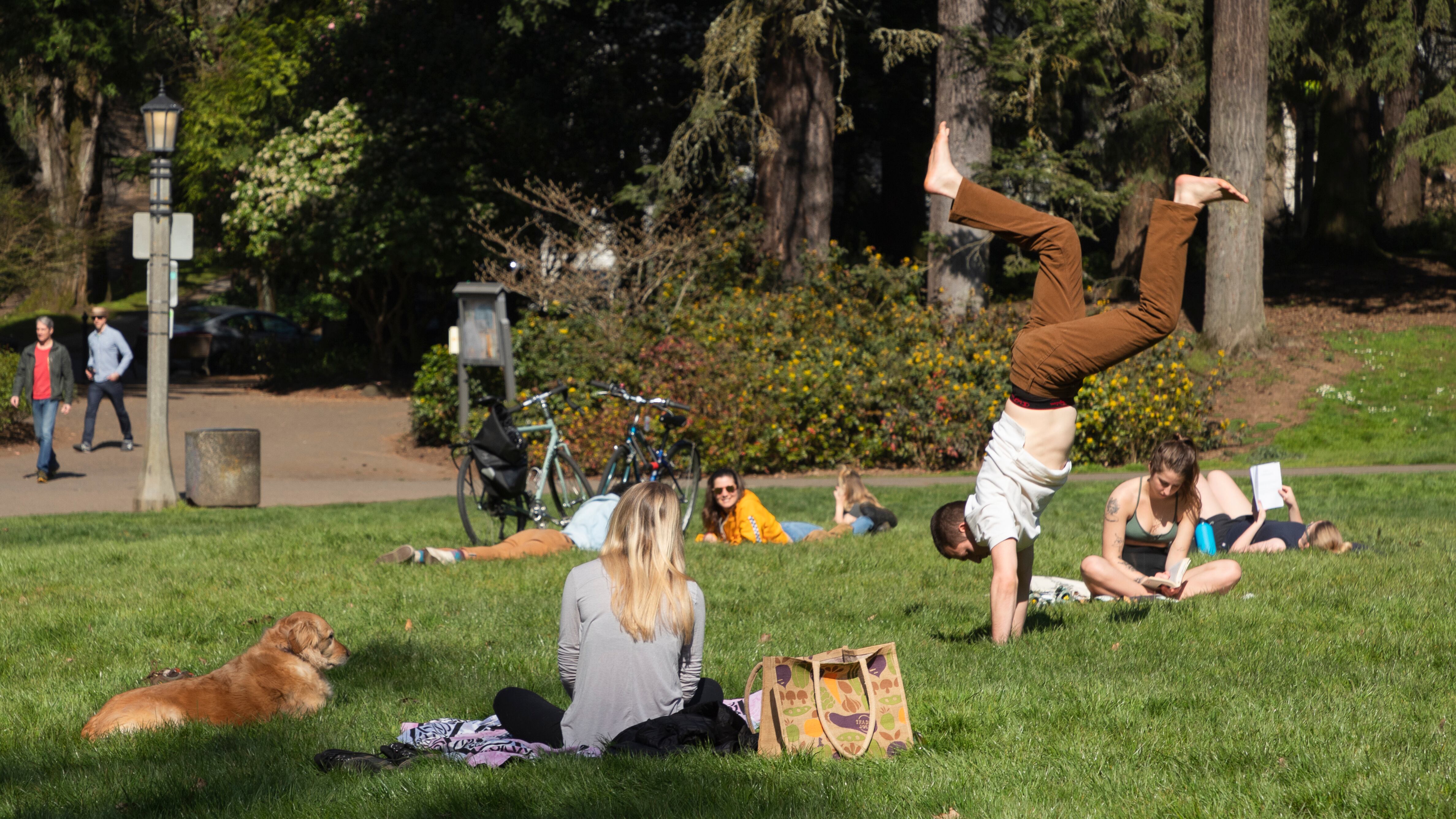One week ago, Vivian Satterfield grew alarmed at the crowds in Mount Tabor Park.
Satterfield, a community organizer with the environmental nonprofit Verde, was out for her typical afternoon run with her dog, Billie. She arrived planning to keep a 6-foot distance from anybody she encountered on Mount Tabor. But the slopes of the Southeast Portland volcanic cone were jammed.
"By the time I hit the first reservoir, I could see the side of Tabor filled with picnickers," she recalls. "I cut my run short, turned heel and went home."
Satterfield has moved her daily exercise to shortly after dawn. "It's certainly colder and less pleasant to go out on our runs," she says, "but has much less people out."
Her experience isn't unusual. Portland's parks are packed.
In the past week, Oregon Gov. Kate Brown has ordered the closure of nearly every communal space in the state, attempting to slow the spread of the COVID-19 coronavirus. But she and other local officials have encouraged residents to walk, jog and stroll as a means to exercise and preserve their sanity.
In the state's biggest city, that means a run on the parks. Anecdotal evidence suggests Portlanders are using parks at a rate rarely seen in chilly early spring, both for purposes kosher (jogging, sunbathing, playing fetch with dogs) and less so (picnics, happy-hour wine parties, pickup basketball games). Even in these outdoor spaces, it's becoming difficult to avoid close encounters with other people—which is the whole purpose of the statewide shutdown.
That raises an unpleasant question: Are Portland's parks still safe?
This morning, the governor shut down some park amenities: She closed playgrounds and basketball courts statewide, trying to keep people from touching the same surfaces. (She also shut down all state parks and campgrounds.) Brown required city park departments to posts signs at all entrances and plazas, warning people to remain 6 feet apart.
"Users of open public recreational areas," the order states, "must strictly adhere to social distancing guidelines."
In other cities, parks have already been singled out as hot beds of COVID-19 transmission. New York City Mayor Bill de Blasio on Sunday warned that he would use police to enforce distance between people in parks.
"When we say you can go out for some exercise, we're not saying you can linger," de Blasio said. "We're not saying you can make a day of it. We're saying go out, get a minimum amount of exercise and go back indoors."
Portland officials haven't been that strident. (Portland also hasn't yet experienced the outbreak to the shattering degree occurring in New York City.) For now, officials say the parks are open—but encourage people to use them cautiously.
"Please always observe the [Centers for Disease Control and Prevention's] minimum recommended social distancing standards and stay 6 feet away from other individuals," says Portland Parks & Recreation spokesman Mark Ross in a statement. "If 6 feet of social distancing is not possible, park visitors should find an alternative location or leave that space."
The parks bureau has warned visitors to wash their hands before and after going out, to expect limited restroom availability, and to stay home if feeling ill. Parks officials also advise new etiquette on trails: Announce yourself to people you see coming, then step aside to allow 6 feet of clearance.
The Multnomah County Health Department echoed that advice. By this weekend, health officials were advising what the governor ordered this morning: Stay off playgrounds, and don't share sports equipment.
It's not clear what officials will do if today's statewide closures—which leave parks as one of the few remaining public spaces—create more demand.
"We're saying go outside and play," says Multnomah County spokeswoman Julie Sullivan-Springhetti. "Get your vitamin D. But use your common sense to do it in the safest way possible."

